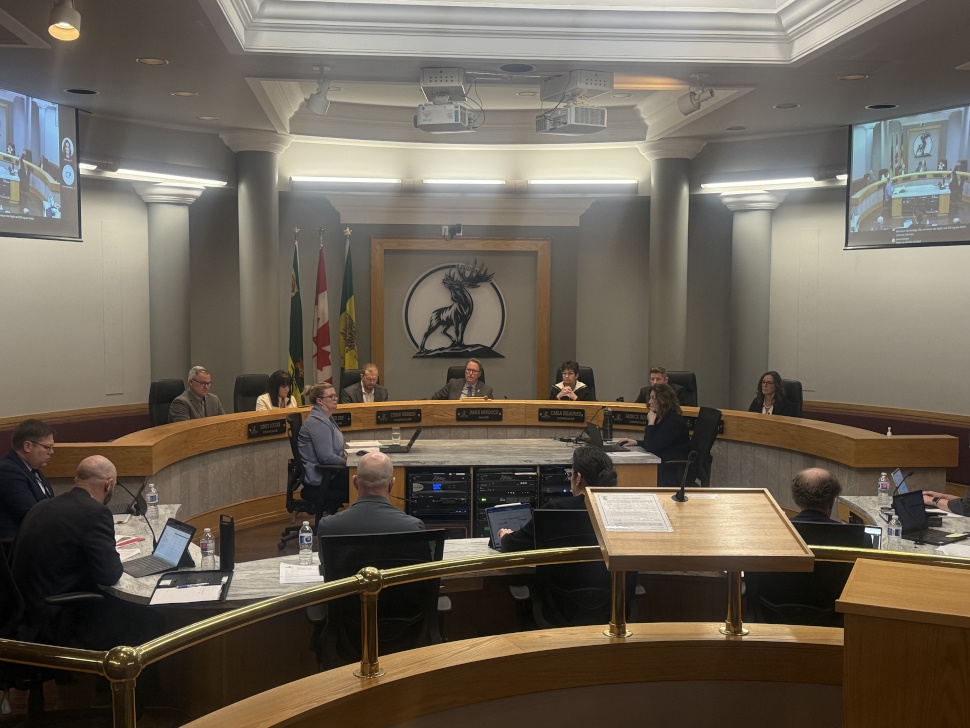Moose Jaw will remain under the jurisdiction of the Saskatchewan Assessment Management Agency (SAMA) for at least another five years after city council voted Monday to approve a renewed contract — but not without vocal criticism, procedural confusion, and debate over transparency and accountability.
The contract, which runs from 2026 through 2030, maintains SAMA’s full control over property assessments in Moose Jaw and includes no significant changes to oversight, despite a call from both the public and one councillor to strengthen reporting requirements.
“They get paid more when they do a bad job”: Van Slyck
Local business owner Kristy Van Slyck addressed council during the public hearing portion of the meeting, urging members to reconsider the contract or amend it to include stricter quality control measures.
“There is no quality control provided by the city,” she said. “SAMA has full control over our assessment system.”
Van Slyck said she and others were frustrated that legal fees for property assessment appeals are covered by the city, even if SAMA loses those appeals. She argued this creates a perverse incentive.
“They get paid more when they do a bad job. Because we appeal — and they get paid to appeal it.”
Van Slyck also noted that, under the current agreement, SAMA is supposed to submit the city’s assessment roll by Jan. 31 each year, but hasn’t met that deadline in over a decade.
"I also noticed within the contract there was something about they have to have the assessments to the City of Moose Jaw by January 31st of every year. I checked back for 12 years. They have never in the 12 years got it to that date, so I'm asking ... is there a consequence or do we just say it as a suggestion?
"At one meeting, (Director of Financial Services) Brian Acker stated that they need at least a month after they receive (the assessments) to correct all the errors. They go back and forth with SAMA to make sure it's correct before they send it out with their tax notices.
"Where is the quality control? And if they are already breaking the clause and we're going to re-go into that clause, is there a consequence? Or does it not matter?"
She called for an external audit every revaluation cycle, approved by the Canadian Federation of Independent Business, and recommended forming a local governance committee similar to the one used in Saskatoon.
Warren proposes operational guideline
Coun. Chris Warren attempted to respond to those concerns with an amendment to the motion. He proposed the creation of an operational guideline that would formalize expectations for annual reporting from SAMA and minimum requirements for public engagement, including one open house and one educational session per year.
“This doesn’t change the contract,” Warren said. “It just gives clarity to administration and strengthens expectations.”
His proposal included requirements for SAMA to report annually on cap rate changes, legislative impacts, appeal outcomes, and legal costs — all points raised in Van Slyck’s presentation.
However, after double-checking with City Clerk Tracy Wittke, the amendment was ruled out of order, as it did not add, delete, or change the text of the motion on the table, as required by procedural rules. Council briefly went in-camera (a Latin phrase meaning 'in privacy') for legal advice before returning to open session, where Warren gave notice that he would introduce a separate motion at a future meeting.
Luhning warns against conflict of interest
During the debate, Coun. Dawn Luhning, who is a member of SAMA's board of directors, cautioned against any attempt to give council or city administration influence over property values.
“Nobody in this city wants the city to have a conflict of interest about how your assessment is completed,” she said. “We should not have any part of that. ... But there's people in the room that think that that's the way it should be done, that we should have influence as city council, as administration, as to how your assessment is managed.
"That is not what should happen in our world. In the city of Moose Jaw or anywhere else. You do not want your elected officials and your administration to be telling you what your assessment should be, because we want as much money as possible — we don't have enough money to do everything. There's a reason why assessment is separate from the administration of taxes, which is what we do."
Luhning directed pointed remarks at the gallery, making clear her frustration with years of questions asked about SAMA and its practices and accountability.
“We don’t just willy-nilly ask SAMA to do a secondary audit because somebody’s upset with their assessment,” she said. “There’s a process for that — and whether we like it or not, it’s the appeal process.
"But there are people out there who are going to make you believe that we should be controlling your assessment. Uh-uh. I'm not going to have any part of that, because that's a conflict of interest for me as an elected official to have any kind of bias towards how your assessment is done. ... It is wrong and it is 100 per cent wrong and I'm kind of really tired of that rumor."
Contract details and operational guidelines
The renewed agreement preserves SAMA’s authority over Moose Jaw’s property assessment system and includes the following provisions:
- CPI-based annual fee adjustments
- Legal costs beyond an initial $60,000 to be paid by the city
- A requirement for SAMA to present annually to council, by request
- Optional public education sessions, also by request
Critics say these provisions lack teeth and fail to ensure meaningful public reporting or enforce deadlines. Warren’s proposed operational guideline would have formalized some of those expectations, but will now be debated separately.
Warren’s separate motion to develop an operational guideline is expected at the next council meeting.
